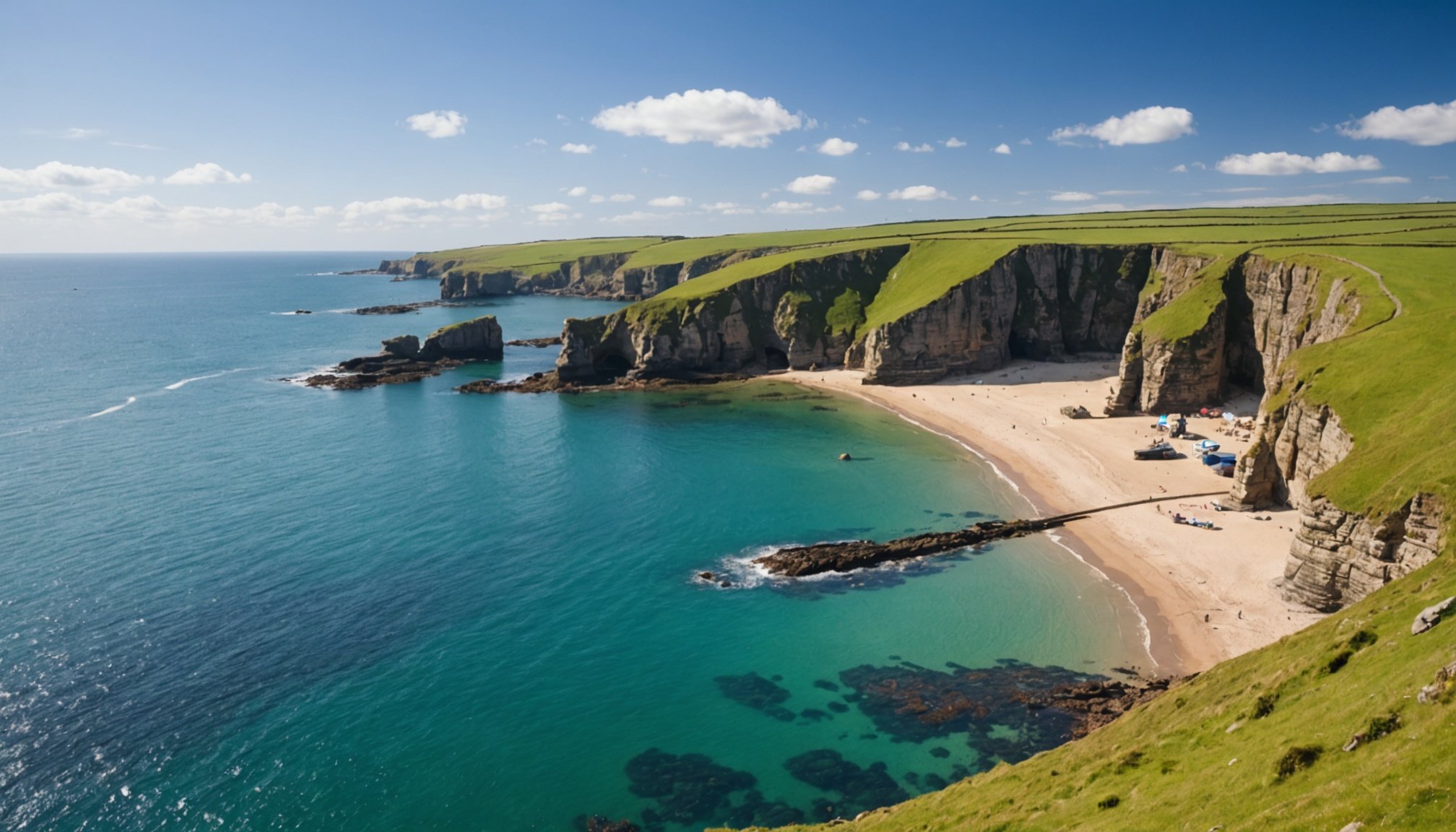Overview of Marine Archaeology
Marine archaeology delves into the enigmatic depths of our oceans, seas, and other water bodies to uncover what lies beneath. By studying shipwrecks, submerged settlements, and lost artefacts, researchers unlock the mysteries of ancient maritime cultures. The significance of this field extends to preserving history and informing contemporary society about our shared past.
The United Kingdom, with its vast coastline, boasts an illustrious maritime history. From Roman ships to medieval cargo vessels, UK coastal towns are treasure troves for marine archaeologists. This rich heritage highlights the evolving relationship between humans and the sea, offering insights into trade, warfare, and daily life from bygone eras.
Also to discover : Explore the Top UK Festivals for a Deep Dive into Enchanting British Folk Tales
Guided tours play a pivotal role in promoting marine archaeological sites. They not only boost local tourism but also raise awareness about preserving these fragile underwater resources. Visitors gain a deeper appreciation for marine archaeology through interactive experiences, such as diving excursions and museum exhibits. These tours ensure that the stories of the deep continue to captivate and inspire future generations.
Understanding marine archaeology’s multifaceted nature can inspire efforts towards conservation, reveal connections to our ancestors, and maintain the heritage landscapes of coastal regions.
Also read : Discover the Best UK Spots for Hands-On Workshops in Classic British Toy Soldier Crafting
Top UK Coastal Towns with Guided Tours
Exploring UK coastal towns offers a unique glimpse into marine archaeology’s mysterious past. Many towns are known for fascinating guided tours, taking intrepid explorers back in time.
One notable location is Lyme Regis. Not only famous for its Jurassic Coast World Heritage Site but also the abundance of fossil tours, making it a delight for geology enthusiasts and history buffs alike. Guided walks here allow visitors to unearth fossils while learning about the ancient history of the region.
Next on the list is Whitby, renowned for its dramatic cliffs and maritime heritage. Visitors can enjoy guided tours that delve into the town’s ties with Captain Cook and its influence on Bram Stoker’s Dracula. The spooky yet exciting atmosphere makes it a captivating visit.
Further north, Anstruther in Scotland shines with its focus on local marine life. Known for its fisheries museum, it offers tours exploring the lives of fishermen and the diverse creatures dwelling beneath the waves.
Accessibility is key for these adventures. Each town ensures that local resources support tourists, with well-kept paths and informative guides enhancing each tour’s experience. Whether it’s learning about ancient marine archaeology or relishing seascape views, these towns promise a captivating journey.
Key Marine Archaeological Sites to Explore
Exploring marine archaeological sites offers a fascinating glimpse into our past. These sites are teeming with historical significance, offering insights into ancient civilisations and cultures. Many locations offer guided tours, helping visitors delve deeper into their historical treasures.
Town A: Historical Highlights
In Town A, significant discoveries have shaped our understanding of the past. The site is renowned for its rich collection of marine archaeological sites that boast remarkable historical significance. Among the noteworthy sites, the ancient shipwrecks stand out, revealing trade routes and maritime tactics from centuries ago. Guided tours are available, enabling visitors to explore these submerged wonders thoroughly. These tours provide informative narratives that enhance the visitor experience, allowing them to appreciate the true importance of these archaeological treasures.
Town B: Unique Discoveries
Town B has become famous for its distinctive marine archaeological finds. Among the key sites to visit are the underwater caverns filled with prehistoric artefacts. These finds offer a unique perspective on ancient marine archaeological sites. Local organizations play a crucial role in preserving this history, ensuring that these treasures remain intact for future generations. Guided tours highlight these efforts, revealing the meticulous work involved in uncovering and preserving the past.
Town C: Cultural Impact
Town C’s maritime archaeological discoveries hold great historical significance. These findings have not only informed our historical understanding but have also deeply influenced local culture. Guided tours serve as a vital tool for educating the public about these historical treasures. Through community involvement and local heritage initiatives, residents embrace and celebrate their rich past. Such inclusive efforts are essential in maintaining and promoting the historical legacy of Town C’s marine archaeological sites.
Types of Guided Tours Available
For those keen on guided tours, a range of options cater to diverse interests in marine archaeology. These tours vary widely, offering unique experiences depending on your preference.
Walking tours are ideal for those who prefer staying dry while gaining expert insights. These often involve coast-side explorations where guides share stories and historical significance of the maritime remnants visible from shore.
Diving tours, on the other hand, are for the more adventurous. Participants get to immerse themselves literally in undersea sites, exploring shipwrecks and submerged artefacts firsthand. These tours provide a sense of direct connection with history beneath the waves, making it an unforgettable marine archaeology experience.
For those seeking a deeper understanding, educational tours focus on learning. They might combine walking and diving with interactive sessions led by archaeologists and historians who offer their expert knowledge.
Each type of tour has its unique benefits, allowing participants to engage at their comfort level while enriching their understanding of maritime history. Tour guides often tailor experiences to combine entertainment with education, ensuring a fulfilling experience for all participants.
Expert Insights and Local Perspectives
Marine archaeology reveals hidden chapters of our maritime heritage. By talking to both marine archaeologists and tour guides, we gain valuable perspectives on the local culture and its connections to the sea.
Marine Archaeologists’ Perspectives
Interviews with seasoned marine archaeologists highlight the immense value of marine archaeology in unearthing history that spans centuries. They underline its role in enhancing our understanding of trade routes, shipbuilding techniques, and ancient civilisations. Marine experts often mention the meticulous process required to preserve artefacts, which emphasises the field’s intricate nature.
Tour Guides and Community Engagement
Tour guides provide a unique lens through which visitors can explore sunken treasures and be immersed in local culture. Their tales interweave historical facts with captivating narratives, making discoveries more relatable and engaging. Tour guides often share how communities collaborate to protect these underwater sites, ensuring the heritage is preserved for future generations.
Maritime Heritage Importance
Communities near significant sites are actively involved in maintaining these legacies. They recognise the importance of maritime heritage, not just in shaping their identity but also as a source of education and tourism. Their engagement in marine archaeology projects strengthens cultural pride, benefiting both locals and visitors.
The Impact of Marine Archaeology on Local Culture
Marine archaeology plays a significant role in shaping local culture through its profound influence on community identity and heritage appreciation. By uncovering the mysteries of the sea, it offers numerous economic and cultural benefits to the region. One of the primary benefits includes attracting tourism, which serves as an economic boon to local economies. Tourism impact is felt strongly as visitors are drawn to explore the rich marine heritage, boosting local businesses, and creating jobs.
Moreover, communities often celebrate their maritime history through festivals and events. These activities not only help to preserve the heritage but also foster a sense of pride and belonging among residents. They serve as perfect avenues for both locals and visitors to engage with the past in a lively and educational setting.
The long-term implications of marine archaeology extend beyond immediate economic gains. By embedding maritime heritage into cultural narratives, it ensures sustainable tourism development. This strategy aids in preserving the authentic aspects of local culture while keeping up with modern demands. Ultimately, marine archaeology enhances communal ties, instills cultural pride, and underscores the importance of safeguarding underwater treasures for future generations.











